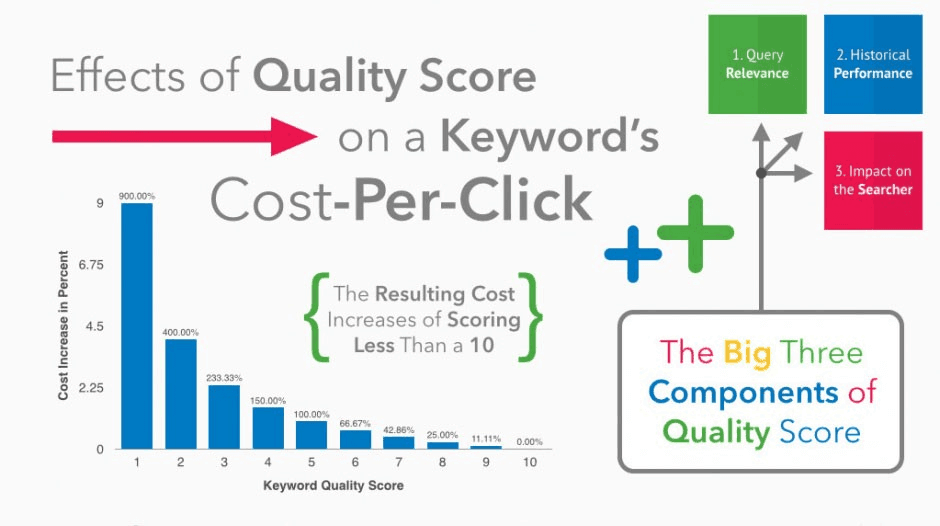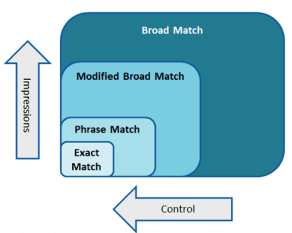How to Increase Your Keyword Quality Score
Quality Score and CTR (Click-through-rate) are part of what determines your ad rank, or how your ad performs on AdWords. If you improve one of these factors, you will improve the others since they all work together. As campaigns perform better, they bring the right customers to you as a business owner and reduce your overall ad spend. In this post, we will focus specifically on Quality Score.
A Quality Score is a 1-10 number that is an automated opinion on the type of experience a searcher will have with your selected PPC keywords. The reason the Quality Score matters to Google AdWords Experts is that it accounts for a large percentage of the overall ad rank. And it is this rank that determines where an ad is shown in the search results. Improving the Quality Score can increase an ad’s position while also lowering the bid without actually doing anything to your bids.

This visible Quality Score is the number you, as a Google AdWords Expert, see in your AdWords account based on ad relevance, landing pages, and expected CTR. Note that this Quality Score is not what is used in the actual auction which happens every time someone conducts a search on Google.com or visits a partner site that displays AdWords ads.
This is why you might see a change in how your ad ranks during the time of the auction but not see a change in the Quality Score visible in your account. Think of this visible Quality Score as a guide for areas Google thinks needs to be improved in your AdWords account. During the actual auction, your Quality Score is influenced by location and network, in addition to the user’s search query.
What confuses advertisers is when their ad appears relevant because they have exact match keywords and have incorporated these keywords into the headlines and/or description of the ad. In fact, Google encourages appropriate use of keywords in the ad group, landing page and ad copy. Although it appears relevant based on those factors, Google also looks for supporting keywords to determine relevance. As a Google AdWords Expert, you want to ask yourself if the supporting keywords in your ad are useful for the searcher. When Google determines that the overall ad relevance is poor, it is often an indicator that better organization is needed for the ad groups or different ads should be created which is why you want to look at all of these factors together.
The conversion rate for the exact match keyword type is higher than other keywords because Google is all about relevance and exact match keywords are highly relevant. The keywords exactly match the search query entered by a user. As a result, with exact match keywords, it will take fewer clicks to get a positive outcome with your ads. This does not necessarily mean you would start a new campaign with only exact match keywords. Watch this 4 minute video for an explanation on the different keyword match types.
https://www.youtube.com/watch?v=ZLfxIKw1V3Y
For example, an advertiser that sells tennis shoes could use that as a phrase match. A searcher triggers an ad with a search query of red tennis shoes. As the advertiser, if red tennis shoes is relevant to your product line, you can then use that search phrase as a new exact match.

Although this tennis shoes example is a simple one, it shows how the other keyword types can lead to you including new exact match phrases in separate groups based on what was triggered in a search from a phrase match.
Starting with phrase match, broad match, and broad modifier modifier can help Google AdWords Expert discover the right exact match keywords to potentially use in separate highly relevant, single keyword ad groups. If the conversion rates vary significantly among the match types, Optimising for keyword types and isolating each of these in a separate group could result in a higher conversion rates and a better Quality Score. Since exact match keywords result in higher conversion rates and fewer clicks, Google AdWords Expert would set a higher bid on relevant keywords in this group that still still keep them within targeted costs. When keywords are more relevant, the click-through-rate (CTR) may increase. The Quality Score will increase if the keywords are relevant and the landing page experience is good and and the expected CTR improves. Since the Quality Score impacts the ad rank, the relative cost could go down even as your ad position improves.

While you want a higher number for your Quality Score, your goal is to not always have a perfect 10 for the Quality Score. Remember that your Quality Score is not a KPI that you report on. It is an optimisation tool. Google AdWords Expert use it to guide decisions and optimisation strategies.
Before making account changes or creating new ad groups, first view your existing Quality Scores remember that they are simply a guide. If most impressions have a Quality Score in the upper ranges of 7, 8 and 9, there may be some work to do on your Quality Score, but do not change things for the sake of changing them. Those words may be performing just fine in the campaign. Instead, it is important to first develop an understanding of where you are today in terms of overall AdWords campaign performance, then decide which ad groups need work.
Brad Geddes, a well-known industry leader in the PPC space, offers an easy Quality Score workflow to guide advertisers about what to change in an account to make improvements. If you determine an ad group needs some improvement with the Quality Score, start by reviewing the landing page and the use of keywords in it. If you are comfortable with the keyword use on the landing page, next determine if the keywords make sense for that specific ad group. It is quite possible there are too many keywords in an ad group that are not well connected by theme. If the keywords seem to address too many of your offers, create new ad groups with the keywords that were not performing well. And of course, testing and optimisation are an ongoing process for all Google AdWords Experts. The below workflow from Geddes is helpful when reviewing your account data and making decisions about what to improve. Now that only four ads maximum will show above the search results on Google.com, your ad ranking is crucial and this improvement happens in your ad groups as well as your landing page.

For those who want to go even deeper and to really drill into different factors impacting ranking, read the paper by Google co-founder Larry Page and Sergey Brin, The PageRank Citation Ranking: Bringing Order to the Web. It offers a lot of insight about how quality overall impacts ranking. And if you are really into science, read about “term frequency – inverse document frequency” to learn how ad relevance is calculated. If that is a little too much for you though, stick with the above workflow from Geddes when auditing your Quality Score and account performance and you will see improvement in your campaigns.
